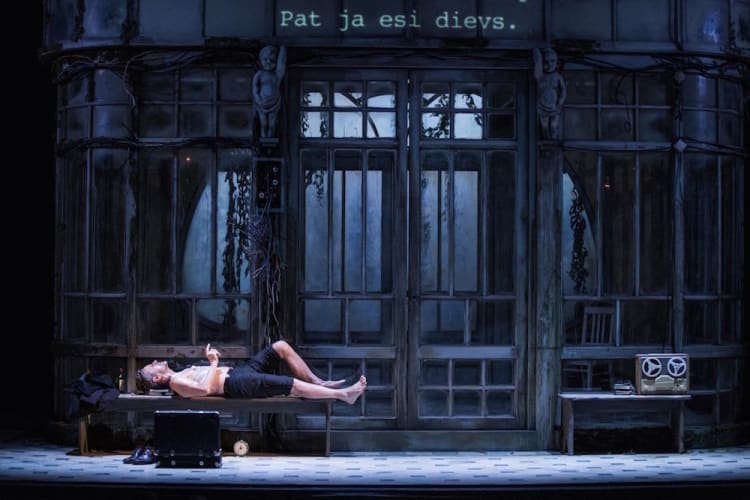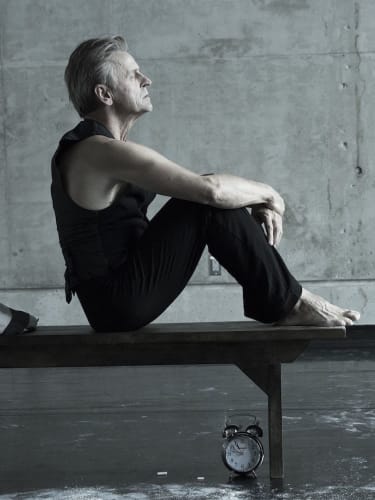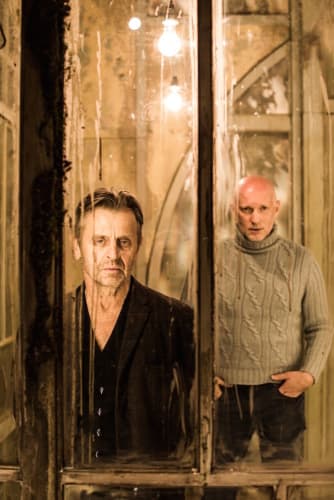Tardis-like, a glass conservatory (design by Kristine Jurjane) stands in the middle of the stage. In a ninety-minute solo Mikhail Baryshnikov time travels through Josef Brodsky’s verse, slowly creating and bringing to life in miniature elegant detail a mosaic of his friend, an ‘in memoriam’ to a friendship that transcends time, a ‘Krapp’s Last Tape’ that is about the merging of the self with a kindred spirit, two souls as one, an affinity that death cannot sunder.
Evocative poetry in word and action, Brodsky / Baryshnikov at the Apollo for only four performances is a special event. Tickets are expensive, but the theatre is packed, mostly with Russian expats, ballerina Natalia Osipova amongst them.
Josef Brodsky, the Nobel Prize winning poet-philosopher, and Mikhail Baryshnikov, the internationally famous ballet dancer, eight years apart in age, forged the closest of friendships, speaking to each other almost every day. Brodsky exiled by his country, Baryshnikov a defector, both with shared memories of Leningrad / St Petersburg.
Brodsky dedicated many poems to his friend, whom he playfully called Mysh (mouse), and he was Joseph the cat. Like Pushkin, Brodsky frequently illustrated his poems with drawings and signed himself with a sketch of a cat. And Mysh, today’s unhurried feline, was often his first reader.
Is the ‘glass house’ a stand-in for his family’s “room and a half” (as Brodsky described it—director Andrey Khrzhanovsky made a captivating essence of Brodsky multimedia film under that title in 2008) in a communal flat, the two putti holding up the architraving suggesting St Petersburg’s classical building that housed it? Now it looks empty and abandoned.
A man—jacket, waistcoat, no shirt, shoes but no socks—turns up with a small suitcase. Walks through and sits down on the bench outside. Takes out a cigarette, rips off filter tip, no matches. Takes out an alarm clock and a half bottle of Jameson whiskey. Puts his glasses on, gets out a book. Reads to himself. Takes a swig from the bottle.
On another bench, a reel-to-reel tape recorder. Baryshnikov moves from one to the other; from outside to inside the room lit with flickering bare light bulbs. Words scroll above his head on the building. “You’re home, so what who needs you, who wants you back, it’s all your fault.” He walks alone. Remembers the seagulls, the harbour, the boats.
He’s back home, but in reality Brodsky never was allowed home, nor his parents to visit him in America. He and Baryshnikov once dreamed up a madcap scheme to get back to their former home city through the back door—fly to Helsinki and take a boat to St Petersburg—Finns don't need visas. Of course, it never happened.
But how many times does one travel back in one’s thoughts and dreams… Brodsky / Baryshnikov is that imagined return of the prodigal son to the place that fed his verse. What remains of us? Baryshnikov draws on the misted panes of glass. The clock ticks; the fuses crackle and blow.
An elegiac memory clouded by time? “All forms of life are adaptations”. How should the soul adapt to changes? “The eye leaves a trace on things”. He remembers his time exiled in the North, the mosquitoes, the hard labour, the ash on the wind—that’s all that will remain of us, a crushed butt, a ball of spit. Baryshnikov’s body tenses into statues of marble and granite, but moss will grow on them, too.
Inside the room, he becomes a centaur (Brodsky’s illustration replicated in Baryshnikov’s pose) and a spinning shaman. He reads aloud. I hear Brodsky’s voice, but no it’s not the tape—Mysh has his intonation off pat. The poet’s taped voice blends and takes over. “The century will soon end but I’ll be gone before its end”. He died in 1996 a few hours after wishing his Mysh happy birthday.
Water remembers itself; the body transfers to another place. Mysh is reborn as a butterfly / moth: fingers move caterpillar-slow up the glass pane, he flies, flutters, spreads his body against the glass. He’s a fish in a bowl, a melting iceberg, a grain of sand in the desert, and a black stallion turns him into a proud matador.
Age is a tragic Gorgon: Mysh strips to bare feet and torso. He inspects his feet, his legs, hobbles, contorts into Baconesque figures on a chair, mouth open in the pained grimace of Pompeian bodies surprised in death. “The body repents its passion”. “Breath stinks”, joints creak, he faces death. The fuse blows again. Darkness and madness descend, eyesight going, he sucks his thumb, there’s no remedy, death is a deformity.
What Brodsky can’t bear is the death of the mind. The void is worse than hell. The words scroll and we try to get a fix on them, but they slip away. He wanted to die in his native city; he is buried in Venice. Pens are left at his graveside in homage or hope of inspiration.
Images, metaphors, wonderful aphorisms—Baryshnikov makes them vivid. I am a circle erase me. He whitewashes the panes of glass, Brodsky’s remembering of the white fog on a white ship swaddling him. Memory remains. Memory of Baryshnikov, too, as a young man comes to me: his épaulement, his expressive hands.
Clothes on, suitcase repacked, he gets up to leave, hesitates and reads one final poem, taken from a small notebook in his jacket’s inside pocket near his heart. It was written by Brodsky when he was only seventeen - “Farewell, forget and don’t judge too harshly…” - with a maturity beyond his years. But then he had abandoned schooling at thirteen and learnt about life on the skin.
English audiences will find Jamey Gambrell’s translation is very good, and, coupled with the visualised readings in Russian, maybe their original sound will stay in their ears and stir them to read some Brodsky. Alvis Hermanis, director of The New Riga Theatre, whose inspired concept this was, directs with finesse.
Gleb Filshtinski’s lighting is as subtle as the verse, and Ineta Sipunova’s video projection rings the mood finely. But what a brilliant choice is Jim Wilson’s “God’s Chorus of Crickets”, which sounds like a liturgy, but is in fact digitally modified live crickets, that hums gently under the musical sound of the poetry. Sound design is by Oleg Novikovs and Gatis Builis.





